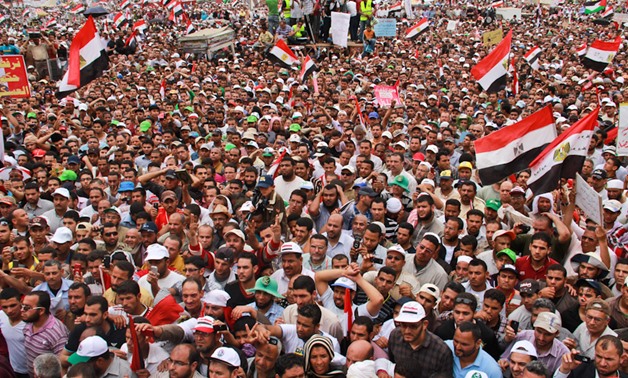
FILE: Egypt’s Tahrir Square during the Arab Spring
CAIRO – 29 April 2018: Egypt’s Misdemeanor Court of Qasr al-Nil fined 35 researchers LE 50,000, and suspended their activities for demonstrating without a permit.
The prosecution charged the defendants with participating in unsanctioned demonstrations, rallying, disturbing public security and peace, disrupting transportation and several other charges.
The defendants held demonstrations to demand working in the government sectors of their respective fields.
Professor of Cardiology at Ain Shams University Khaled Samir said that most of the scientific dsicoveries in Egypt do not add anything substantial to the existing scientific content. He added that Egypt is a country that awards a high number of doctorates, and said that the ministry must stop the high number of master's and doctoral degrees just for promotions or jobs.
Professor in the Faculty of Science, Cairo University, Hany Husseini said that a master costs about LE 25,000 and that a Ph.D. costs around LE 50,000 at Cairo University; students pay all costs and which are supposed to be sponsored by the government, yet students finish their master’s or Ph.D. and still do not find any jobs in Egypt.
According to the Demonstration Law which was passed in 2013; any person who wishes to organize a public meeting, march or protest must give written notice to the police station from which the march will be launched.
The notification must be submitted at least three working days at least before the march or protest, to a maximum of 15 days before. This period is reduced to 24 hours if the meeting was an electoral meeting, on the condition that the notification must be given first-hand or through a marshal.
Proponents of the demonstration law such as legal expert Shaouky al-Sayed said that the demonstration law aims to protect demonstrators by informing the security authorities to secure their stops and end them on their scheduled dates.
He clarified that the law applies to everyone, whether pro-government or opposition, however it does not prevent citizens from expressing their opinions.
On the other hand, opponents of the law argue that it prevents the freedom to demonstrate, adding that the law allows for individuals who violate it to be treated as criminals, in addition to anyone who “aids or incites” such individuals. Such a clause can allow for entire groups of protesters to be punished for the actions of one individual, who in some cases may be an infiltrator whose goal is to sabotage demonstrations.
Meanwhile, Samir Ghattas, a member of the Human Rights Committee told Egypt Today that the problem is not in the law but in the mechanisms of its application.

Comments
Leave a Comment